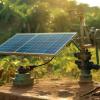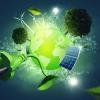Story ideas, media briefings, and press releases specifically for media. If you are a journalist, you can subscribe to receive upcoming press releases by email.
Press Releases

23 August 2023
Solar powered irrigation: a game-changer for small-scale farms in sub-Saharan Africa
A new study finds that standalone solar photovoltaic irrigation systems have the potential to meet more than a third of the water needs for crops in small-scale farms across sub-Saharan Africa.

22 August 2023
Challenges ahead: navigating climate change and water management
Freshwater is vital for humans, ecosystems, and economies. However, climate and socio-economic changes are expected to substantially alter water availability. A pioneering study emphasizes considering future water withdrawals in low flow projections, highlighting the urgency of coordinated efforts to reduce excessive extraction in European rivers.

21 August 2023
Scenarios for proactive measures and inclusive policies on migration in Europe
Migration is a complex and unpredictable phenomenon, often triggered by political crises, economic downturns, and natural or human-made disasters. A new policy brief and a White Paper authored by IIASA researchers and UK colleagues provide valuable insights and recommendations to support policymaking and increase understanding around the realistic implications of high-migration events.

09 August 2023
Unlocking the power of citizen science to monitor health and wellbeing targets
IIASA researchers and experts at the World Health Organization (WHO) have conducted a systematic review of health and wellbeing-related indicators, as well as citizen science initiatives, to explore the potential of citizen science for mobilizing action toward the achievement of health and wellbeing related targets of the Sustainable Development Goals (SDGs) and the WHO’s Triple Billion Targets.

26 July 2023
Ammonia reduction should be prioritized in Europe’s fight against air pollution
Europe still faces numerous challenges in reducing air pollution. A new study by an international team of researchers identified the reduction of ammonia emissions as a cost-effective measure to reduce concentrations of fine particulate matter in the atmosphere.

26 July 2023
Hans Joachim (John) Schellnhuber appointed as IIASA Director General
It is our pleasure to announce the appointment of John Schellnhuber as the new IIASA Director General effective from 1 December 2023.

20 July 2023
Introducing the Climate Solutions Explorer
IIASA recently launched the Climate Solutions Explorer – a comprehensive resource that visualizes and presents vital data about climate mitigation, climate impacts, vulnerabilities, and risks arising from development and climate change.

17 July 2023
Addressing adaptation inequalities in climate research
A new study proposes ways to better incorporate adaptation in climate change research, addressing the uneven distribution of adaptation capacities and needs worldwide.

10 July 2023
First International Vienna Energy and Climate Forum
Registrations are open for the newly established International Vienna Energy and Climate Forum, which will take place for the first time on 2 and 3 November 2023 at the Hofburg Palace in Vienna. It will bring together high-level representatives from member states, international organizations, business, and science including youth representatives and more than 1,000 international experts to discuss best practices and present solutions to tackle climate change and achieve a green energy transition.
